Lenore Skenazy, President at Let Grow and Founder of the Free-Range Kids Movement, discusses how giving our children opportunities to learn independence at a young age helps them to become independent adults.
Students are capable of making smart and safe decisions from a much younger age than current culture deems appropriate. Compared to two decades ago, what was safe, simple, and easy has become seemingly dangerous, confusing, and difficult — due largely to the media.
What’s popularized in the media, however, isn’t always the reality, Lenore says. If we want our problem solvers of tomorrow to become independent adults, it starts by fortifying them with confidence from a young age.
In this episode, Lenore Skenazy, President at Let Grow and Founder of the Free-Range Kids Movement, explains why it’s so important to give students their independence and discusses how her movement is helping to ease anxieties about letting go.
Keeping Your Student Safe
With advancements in technology, our students are safer now than they have ever been before. The problem, however, is that the dangers of the world have seemingly equally increased — particularly kidnapping.
With such a sentiment, it’s completely understandable why parents everywhere are taking every precaution to avoid the worst. But the reality is much more optimistic. Despite the worry, kidnapping — a rare and unpredictable event — happens substantially less than parents think, Lenore says.

How long, on average, would your student have to wait outside alone at a bus stop before they are kidnapped? Many assume a day, an hour, or even five minutes. The reality: Approximately 750,000 years.
Our brains focus on the standout events. So, while there are 300,000 examples of students safely going to school on their own, it’s the one negative example that we picture first that consumes our decision-making rationality.
Trying to take actionable steps to avoid a rare and unpredictable event may help ease anxieties from media sensationalism, but it does virtually nothing to improve the safety of your student.
While you may not have to monitor your student’s whereabouts as much as you think, that doesn’t mean other safety measures, like teaching your student to wear a seatbelt, have become obsolete. Parents must just shift their attention to what truly matters, Lenore says.
The Unfortunate Tradeoff of Early Risk Avoidance
No matter how unpredictable or unlikely a scenario like kidnapping may be, some may wonder what’s the harm of reducing risk wherever it could exist, no matter the likelihood?
Those small moments of independence that the student would learn early on, if given the vital opportunity, will help give the student a better idea of where true danger exists when they become older.

According to Lenore, if a student grows up to think risk is everywhere, they will have a hard time gauging what a safe environment looks like — leading to an increase in anxiety and depression. A totally safe restaurant, or other public space, may otherwise elicit fear in the student.
How Independence Creates Better Problem Solvers
Think of the student who is given the opportunity to experience the world from a young age on their own: As an example, a student is asked to go to the grocery store to buy some milk. They now have to figure out the following:
- The route to get to the store and back
- How much money to bring along
- What to do if the store is out of milk
- How to deal with a public argument if it arises
If a parent, with tried-and-true methods of buying milk, decides to go to the store with the student, the student loses out on every opportunity to grow except to see the end result: Getting milk — a lesson that now may seem easier than it actually is.
The near endless list of lessons that the student can learn is almost completely taken away if the parent overlooks the need to give them the opportunity.
Adversity leads to better problem solvers. Without these lessons in independence, the student’s problem solving skills will develop at a much later time, and with more difficulty to acquire those same skills.
Research Outcomes from the Let Grow Play Club
To help foster an environment where students have the opportunity to problem solve with others, Lenore formed the Let Grow Play Club. The program consists of an hour before school where a mixed age group of students free-play without electronic devices.
A chaperone is present, but they’re only there to deal with problems that need to be addressed by an adult. Everything else is up to the students to solve.

Through a study by a psychology PhD candidate, it was found that students who engaged with the club had significantly higher standardized test scores than students who did not participate. Lenore suggests that more schools incorporate this kind of club and do their own studies to see just how beneficial it can be to student growth.
Guest Links
Recommended Resources
--
This episode was brought to you by Art of Problem Solving, where students train to become the great problem solvers of tomorrow.
To get weekly episode summaries right to your inbox, follow the podcast at the bottom of this page or anywhere you get podcasts. Ideas for the show? Reach us at podcast@aops.com.












